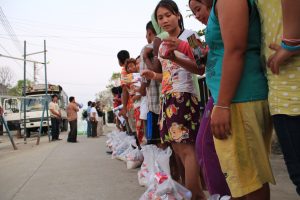A top United Nations official has called on Asian nations to vaccinate their migrant worker populations against COVID-19, citing the unique pressures that migrants had faced during the pandemic.
Speaking at the opening of a three-day international conference on migration in Bangkok, Armida Salsiah Alisjahbana, a U.N. undersecretary general, said that migrant workers should be recognized for what they are: crucial parts of the region’s economies, with an important role to play in the coming recovery.
“The effects [of the pandemic] on migrants have been devastating,” the U.N.’s Armida said. “They have lost jobs and livelihoods. They have been stranded by closed borders. They have been forcibly returned to countries of origins and have faced discrimination, stigma and xenophobia.”
“Migrants will be crucial to the long-term recovery of countries and their contribution to our society must be recognized and valued,” she added. “They must be included in vaccination programs because … we are only safe when everyone is safe.”
Asia is home to 40 percent of the world’s migrant workers, who have flooded to the region’s fast-growing cities in search of work in factories and construction sites.
While migrants have been an important and unheralded part of Asia’s surging economic expansion, they have long been consigned to the margins, paid a pittance for often backbreaking labor, subject to abuse and exploitation by employers, and often unable to access public welfare, social security, and health care.
As Asia’s “essential workers,” migrants have been especially susceptible to infection from COVID-19, something that has been exacerbated by the crowded urban conditions in which many live. They have also been hit hard by border closures.
Nowhere was this more dramatically demonstrated than in Singapore, where COVID-19 tore through the country’s crowded worker dormitories, overburdened facilities in which several people are typically forced to share a single room. According to government statistics, around 47 percent of those tested in migrant worker dormitories were infected with the coronavirus. Out of the 60,062 who have tested positive in Singapore, migrant workers make up more than 56,000.
A similar pattern was seen in in Thailand, which is home to some 2.2 million legal migrant workers, in addition to an unknown number of undocumented migrants. In December, the disease spiked after months of successful containment measures, beginning in Samut Sakhon, a region which is home to many migrant workers, mostly from Myanmar. This came shortly after COVID-19 positive workers crossed the border illegally from Myanmar, prompting additional scattered outbreaks.
The vulnerability of migrant workers to COVID-19 infection has created stigmas against them, and even resulted in people being forcibly deported from some nations. At the time of the Samut Sakhon outbreak, Thai Prime Minister Prayut Chan-o-cha and health officials said that foreign workers who entered the country illicitly were the likely source of a record outbreak of coronavirus cases detected in Samut Sakhon.
Thai Foreign Minister Don Pramudwinai admitted to this week’s Bangkok conference that “misinformation and insensitive messaging in some cases have cast migrants as a threat to public health and security. This must be rectified.”
The conference, which ends on Friday, aims to review progress and identify challenges in implementing the U.N.-backed Global Compact for Safe, Orderly, and Regular Migration. Adopted in 2018, the agreement aims to establish a common approach to international migration, and to ensure that migrants have sustainable livelihoods and are able to access basic services.
So far, there have been encouraging signs that Asian governments recognize the importance of extending vaccination to migrant populations. Nations including Singapore, Thailand, South Korea, and Malaysia have all announced that they will offer COVID-19 vaccines to foreign workers. The latter has assured undocumented workers that they can come forward to receive shots without risk of arrest or deportation.
All these are good indications, but whether migrants will receive equitable access to inoculations, or whether they are extended to other vulnerable populations like refugees, remains to be seen.

































